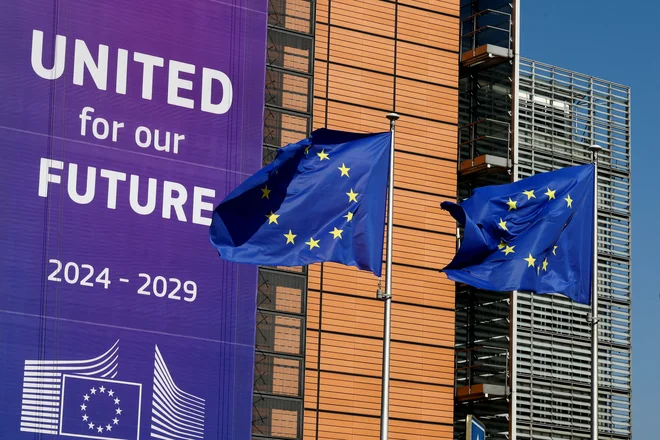There must be a national investment bank, say these prominent figures. Did the Netherlands not ever? And four other questions
:format(webp)/s3/static.nrc.nl/images/gn4/stripped/data128920563-659b06.jpg)
How can more financing be released for Dutch business? For investments in the energy transition and the expansion of the Dutch defense industry? If it is up to a group of 51 prominent figures from that business and economic science, the answer is: by a National Investment Bank (NIB) to set up.
Under the plan that has been distributed in recent weeks among ministries and MPs, the names of, among others, Constantijn van Oranje, former minister Neelie Kroes and entrepreneurs Michiel Muller (Picnic) and Ali Niknam (Bunq). According to the signatories, the Netherlands without NIB does not have a ‘powerful government vehicle’ for corporate financing, including for the energy transition and scale-ups In, for example, AI. Moreover, the Netherlands does not have a good discussion partner for the European investment bank that will play an increasingly important role in the distribution of funds. And Germany and France do have a national investment bank.
1. What is a National Investment Bank?
That is a bank that focuses on the financing of companies on behalf of the government. Such a bank receives capital from the government and can thus raise money from investors in the financial markets. The current plan provides 100 billion euros in financing space with 10 to 12 billion euros in government capital.
That space can be used to take out loans or to buy shares. In principle, this involves shares of companies with a little more risk than a commercial bank daring – because, for example, a technique has not yet been proven. Or for the Netherlands essential activities – think of Defense. If a company can stand on its own two feet, then normal banks must take over the financing again. « The aim is to overcome and, if possible, resolve market failure, » the memorandum says.
2. Did the Netherlands not have an investment bank before?
Yes: the National Investment Bank. It was founded as a recovery bank after the Second World War to stimulate the reconstruction of the economy. Then you also had the Society for Industrial Projects (MIP). It was founded in the 1980s to get new industrial projects off the ground. A venture investor actually.
Both institutions were fully privatized in the nineties, because government involvement with the financial sector was no longer deemed necessary. The National Investment Bank is now a mortgage bank as NIBC. The MIP was transformed around 2003 into private equity firm Alpinvest. Both parties are now in American hands.
There are still business government financiers. For example, there are nine regional development companies (ROMs) that act as a kind of government investment banks. Furthermore, there is also the FMO, an investment bank that focuses on developing countries and themes.
3. Is this resurrection a new idea?
No, certainly not. After the credit crisis and European debt crisis, for example, it has been argued several times for the re -establishment of a National Investment Bank. One of the current signatories, former top officer Jeroen Kremers, wrote a plan in 2016 for another signer, then Minister of Finance Jeroen Dijsselbloem, a plan. This resulted in Invest-NL and Invest-International, but those funds cannot raise money themselves and therefore do not have the scale that a NIB can have.
A few years ago, the Scientific Council for Government Policy also argued for a NIB and at the beginning of this year Theo Henrar, foreman of industrial branch association FME, started over it In an interview with NRC. As a result of that last interview, the initiative was taken to the memorandum of six A4s.
/s3/static.nrc.nl/wp-content/uploads/2025/04/14205807/data130880960-49d30e.jpg) Ammunition models at a stand at the Defense Fair Neds.
Ammunition models at a stand at the Defense Fair Neds. 4. Why a new attempt?
The initiators think there is a momentum. Very practically speaking, it is currently investigating whether Invest-NL and Invest-International should be merged-if those two are transformed into a NIB, the latter would immediately have starting capital, so former top officer Kremers explains over the telephone.
The geopolitical momentum is even more important. In Europe and the Netherlands, administrators seem to finally see the need for investments in their own economy and industry, by the straps of US President Donald Trump and the need to strengthen the European, in connection with the war in Ukraine. In the report-to-draghi on how to boost European growth, a major role is also assigned to several times National Promotional Banks.
5. How much chance of success does this have?
First of all, political will is required. That is still unclear: for the time being, the Ministry of Finance only announced that it would study the letter.
If the new National Investment Bank comes, the question is whether it will be set up in such a way that it has a right to exist in the long term: the next cabinet should not be able to turn the bank again immediately, as has been done with the growth fund. The memorandum therefore states that the bank must become a « professionally guided, private financial group » « with an independent status and mandate. » If external financiers have no faith in this, they will not provide leverage on top of the capital provided by the government. Then the NIB remains toothless.
Professor of Financial Markets Arnoud Boot (UvA), who included the WRR report, shares the need, but does not think that the government will manage this. He argues for the involvement of private investors as co-shareholders in the bank. « The professionalism must be salvaged because you have to stay ahead of the fickle of government. Private interference can cause more consistent policy than current politics. »
PWC’s chief economist and professor of Applied Economy (UvA) Barbara Baarsma agrees. She does hope that this plan succeeds. « All political parties have realized that the Netherlands gets stuck. With such a bank we can take a step – also because other than the politicians of today can persist a much longer horizon. »
Read also
European Commission is coming up with REEMENING PLAN for 800 billion, including politically sensitive joint loans

/s3/static.nrc.nl/images/gn4/stripped/data133212332-41b949.jpg)
:format(webp)/s3/static.nrc.nl/images/gn4/stripped/data133314127-765aec.jpg)
:format(jpeg):fill(f8f8f8,true)/s3/static.nrc.nl/wp-content/uploads/2019/10/youp5bij3.png)



